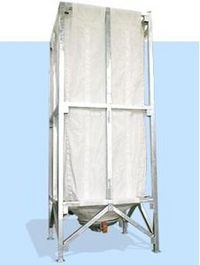Fabric Silos
Jump to navigation
Jump to search
Fabric Silos are commonly used for the storage of a range of products such as flour and grains. They are manufactured in the measurements requested and adapt to fit the metal structure in which they are generally installed. The most commonly-used material for manufacturing fabric silos is polyester. It is made with the eyelets necessary to secure it to the structure, as well as inspection windows and any other special features.
Typical Advantages
- Elimination of condensation and moisture problems within dry ingredient silos
- Improvement of product flow and reduction of product bridging
- The silo lid is a breathable filter medium allowing dust free filling of the silo without the need for a separate filtration system
- High Strength fabric possesses enormous strength characteristics and can hold 50 metric tones of product
- Available in over 200 types of uncoated and coated fabrics suitable for a multitude of applications
- Fabric is flame retardant, non-conductive, antistatic, rot-proof and non corrosive.
- Silo systems can be adapted to building height and are available in square or rectangular designs to maximize your available space.
- Modular and flexible system allows for easy and quick assembly minimizing disruptions of ongoing production.
- Weatherproof and temperature resistant materials are available for outdoor locations.
- Very cost-efficient in comparison to steel silos.
Video
